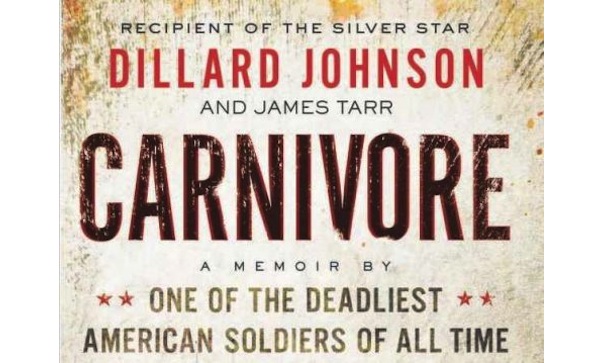The dust jacket of Carnivore, a memoir by Sargent Dillard Johnson with assistance from journalist James Tarr, bills Johnson as “on of the deadliest soldier of all time” and alludes to an astonishing kill count of 2,700. Johnson doesn’t quite claim that number pages of his book, but he does take credit for a staggering number of enemies killed in his capacity of commander of a Bradley Fighting Vehicle and as a marksman during the course of two tours in Iraq.
Let’s put aside, for the moment, that there are plenty of artillerymen, bomber pilots, and other ordnance deliverers who could conceivably claim to be deadlier, never mind Special Forces operators.
Let’s put aside the fact that Johnson is counting the kills of the entire five man Bradley has his own—and that fact that if commanders get credit for their underling’s kills, then there are hundreds of officers ahead of him in the “deadliest solider of all time” title fight.
Let’s put aside the fact that Johnson was featured in a notorious Soldier of Fortune article that read like a piece of Rambo fan fiction. Let’s also put aside the fact that Soldier of Fortune claimed Johnson as their source, and that Soldier of Fortune’s nickname is Soldier of Fiction, and that it has a tendency to see things through decidedly sophomoric glasses.
Let’s put aside the fact that 2,700 kills is about 500 more than what Johnson’s unit got in total.
Let’s put aside the fact that those who served with Johnson are calling him a liar, and let’s put aside the fact that some of them are calling for him to be brought up on stolen valour charges.
Let’s put all that aside, and assume, for the moment, Johnson’s point of view: his publishers are exaggerating his numbers for book sales, his co-author is responsible for the books’ mistakes, someone else was responsible for his Soldier of Fortune debut, all the negative reaction from his former brothers in arms are the result of personality conflicts, the US army is bad at counting casualties, and so on. Ignoring all the criticisms of his book, and generously assuming that everything just sort of muddles out in Johnson’s favour, is Carnivore a worthwhile memoir?
Not really, no.
Frankly, it’s a shame that otherwise good blogs have recommended it, and it’s nothing short of astonishing that the New York Post’s Gary Buiso referred to Johnson as “humble”; either Busio didn’t read the book, or he can’t read at all.
Johnson begins his memoir in Bosnia, recounting an incident when he had orders to go somewhere and an airman guarding a gate had orders to not let anyone past. The guard gestures with his gun, Johnson with his rather larger one, being part of mobile armour and all, and Johnson drives off, laughing at the man’s stupidity, never quite realizing that their positions were equally stupid; Johnson merely had the bigger gun. If Carnivore has a theme, it is this.
After some mundane accounting of Johnson’s childhood, Cold War experience, family life, and Gulf War experience, we finally dive into the Second Gulf War, where the Seventh Cavalry was the tip of the spear slouching towards Baghdad. This is the tragedy of the book: by all accounts, Carnivore could have been terribly interesting. We forget that before Iraq was a fetid insurgency fought with IEDs, it was a conventional war fought with massive tank armies. Johnson, a twenty-year veteran of the army, was in a prime position to tell a unique story; shame that he needed to thrust the mantle of hero upon himself.
Johnson never really develops the self-awareness required of a good memoirist. Instead he lambasts the “mainstream media” for ignoring all the good things the US did in Iraq, claims that the chemical weapons Saddam used on the Kurds are the very same WMDs that the US was referring to when they made their case for war, endorses a bizarre number of products, and can’t for the life of him understand why Iraqi citizens might take offence at a bunch of English-speaking American soldiers throwing their weight around and threatening them. Johnson is, in short, the kind of soldier who makes you glad that the State Department has diplomats on the ground.
Hopefully, one of the many soldiers Johnson has offended will step forward and set the record straight; the Seventh Cavalry was in the thick of it, and they’re the ones to tell a more honest version of the assault on Baghdad. Memoirs are valuable tools for understanding the successes and mistakes of any war, and memoirs are useful instruments for a post-mortem. Sadly, Carnivore is a very sorry instrument indeed.
————
Dave Robson is the editor of DailyXY. He spends his time reading books, drinking Scotch, and smoking cigars.


